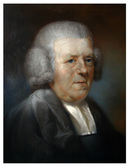The Story Begins

He was a foul-mouthed sailor whose wild behaviour even shocked his less-than-perfect ship-mates. He was a slave trader who had no conscience about buying and selling people for profit. Yet years later this man wrote one of the world’s best loved hymns and inspired a young politician to fight for the abolition of slavery.
“Amazing Grace how sweet the sound that saved a wretch like me…” is John Newton’s song… and describes his dramatic story! But what is the connection between "Amazing Grace" and Buncrana, County Donegal on the shores of Lough Swilly?
Newton – Sailor and Slave Trader
Born in London in 1725, Newton went to sea at the age of 11. He sailed with his father, who was a merchant seaman. In 1744, he was press-ganged into the Navy. Finding the conditions intolerable, he deserted but was caught and dragged back to the ship where he was publicly flogged.
Later Newton arranged a transfer onto a slave ship. Sailing up and down the coast of Sierre Leone in Africa, he collected slaves who had been captured and brought from the interior.
After six months, when his ship was set to sail for the Americas, Newton arranged to stay. He soon regretted the decision when he fell foul of his master’s African mistress. Treated like a slave and half-starved, he was helped by African slaves who risked severe punishment to share their food with him.
Eventually, Newton was offered an escape – passage back to England on a ship called “The Greyhound”. Onboard, he became increasingly foul-mouthed and blasphemous, openly mocking anyone who had a Christian faith.
“Amazing Grace how sweet the sound that saved a wretch like me…” is John Newton’s song… and describes his dramatic story! But what is the connection between "Amazing Grace" and Buncrana, County Donegal on the shores of Lough Swilly?
Newton – Sailor and Slave Trader
Born in London in 1725, Newton went to sea at the age of 11. He sailed with his father, who was a merchant seaman. In 1744, he was press-ganged into the Navy. Finding the conditions intolerable, he deserted but was caught and dragged back to the ship where he was publicly flogged.
Later Newton arranged a transfer onto a slave ship. Sailing up and down the coast of Sierre Leone in Africa, he collected slaves who had been captured and brought from the interior.
After six months, when his ship was set to sail for the Americas, Newton arranged to stay. He soon regretted the decision when he fell foul of his master’s African mistress. Treated like a slave and half-starved, he was helped by African slaves who risked severe punishment to share their food with him.
Eventually, Newton was offered an escape – passage back to England on a ship called “The Greyhound”. Onboard, he became increasingly foul-mouthed and blasphemous, openly mocking anyone who had a Christian faith.
Proudly powered by Weebly